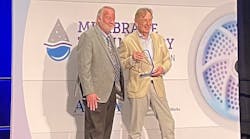Customers are seeing continual improvements in the services they receive from the water industry, according to a report published by OFWATtoday.
Launching the 1999-2000 Report on levels of service for the water industry in England and Wales, the Director General of Water Services, Sir Ian Byatt said, "The water industry is serving its customers and the environment well. The performance of companies in supplying water, dealing with wastewater and responding to customer contact has improved significantly over the ten years since privatization. This is good news at the end of a decade of improvement, and companies should now be maintaining their service standards at high levels, as provided for within the price limits, and make improvements where appropriate."
The report includes an assessment of the overall standard of service provided to customers over the past year. The Director will be sending copies of today's report to the remuneration committees of each company so that they may take performance against service standards into account when setting directors' pay.
Key points from the report are:
Customer service
* The number of billing contacts remains stable at 18.95 million. Over 98 percent were answered within five working days. This is the tenth successive year the industry has shown an improved performance.
* Written complaints have fallen by 3.8 percent, to 147,700. Over 99 percent of written complaints were answered within ten working days, an improvement on last year.
* Against a 15 percent increase in the number of metered accounts, the number of customers billed during the year, based on a company's or customer's meter reading, remained stable at 99.7 percent.
* Meters unread by the companies for two years or more fell to just over one twentieth of one per cent.
* Over 84 percent of calls received by companies were answered within 15 seconds, with almost 91 percent of calls answered within 30 seconds - a slight improvement on last year.
Water services
* The number of properties reported as being at risk of low pressure fell for the tenth successive year, to 30,100, one eighth of one percent of all connected properties.
* The number of unplanned and prolonged (12 hours or more) supply interruptions fell by 24 percent to 11,000 - one twentieth of one per cent of all connected properties, (excluding the serious Kemsing incident
in Mid Kent.) If this is included the overall number of supply interruptions rises to 14,600.
Drinking water quality
* The quality of drinking water, as assessed by the DWI, showed a further improvement. Of just over 2.8 million water quality tests carried out during 1999, 99.82 percent met the required standards, compared with 99.3 percent in 1994 and 99.0 percent in 1990.
Regulatory Action
The Director has written to two companies - South East and Mid Kent where performance is below what OFWATconsiders to be an acceptable level. These companies are required to set out plans for improvement and provide evidence that they are improving service to customers.
South East provided a poor level of service in answering telephone calls and written complaints from customers. The company is required to detail its plans for improvement and to submit monthly progress reports. Mid Kent's performance in maintaining adequate pressure levels to its customers is also causing concern. The company is required to submit improvement plans.
The Director has also written to Dee Valley and Severn Trent whose performance on supply interruptions, while classed as acceptable, has deteriorated.

